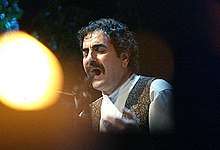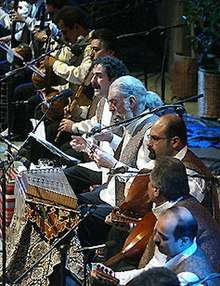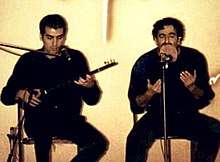Shahram Nazeri
Shahram Nazeri (Kurdish: شارام نازری ,Şehram Nazirî,[2][3] Persian: شهرام ناظری;[4] born 18 February 1950[1]) is a contemporary Kurdish tenor from Kermanshah, Iran who sings classical music. He has been accompanied by some of the masters of Iranian traditional music such as Jalil Shahnaz, Hossein Alizadeh, Jalal Zolfonoun, Parviz Meshkatian and Faramarz Payvar. He has also worked with his son Hafez, a composer.
Shahram Nazeri | |
|---|---|
 | |
| Background information | |
| Born | 18 February 1950[1] Kermanshah, Iran[1] |
| Genres | Kurdish music, Persian music |
| Occupation(s) | Singer, Composer |
| Instruments | Setaar |
| Years active | 1958–present |

Nazeri was the first musician to include Rumi's poetry within Persian music, thus establishing a tradition of Sufi music within both Persian classical music and Kurdish music.[1] The Christian Science Monitor has called him "Iran's Pavarotti".[5] In 2014, he performed a nationalist Kurdish song at his concert in Kermanshah prompting condemnation from Iranian authorities.[6]
Career
Shahram Nazeri has been established as a significant artist in Iran since the 1970s. His first albums which were in the form of mutual albums with Mohammad-Reza Shajarian, were published by the Chavoush institute by the end of the late the 1970s. The content of these albums were filled with liberalism and patriotic ideas.
Nazeri has released over forty recordings to date. His 1980s album The One Hundred-Petalled Rose (in Persian: Gol-e Sadbarg) has held the record for the highest selling album of Persian classical music and Sufi music in history. His musical talents were first nurtured by his mother at a very young age. Throughout his childhood, he was under the tutelage of the most renowned masters of Persian music including Abdollah Davami, Nourali Boroumand, and Mahmood Karimi. At eleven, he performed on the national Iranian television live for the first time.[1] By age 29, he had gained a loyal fan base. He has continued to perform in Iran and abroad over the course of the last two decades. He has performed at major venues worldwide, including The festival of Avignon, Theâtre de la Ville in Paris and The Tokyo Summer festival.[7]
Awards
- Chevalier des Arts et Lettres, by France, 2007.[8]
- Lifetime Cultural Heritage Award, by Asia Society, in 2007.[9]
- Simorgh award, by the International Institute for Dialogue among Cultures and Civilizations, 2007.[10]
- Hafez Film Awards for Best Original Song, Hafez Film Awards, 2015.[6]
Gallery
 Maestro Shahram Nazeri
Maestro Shahram Nazeri.jpg) Shahram and Hafez Nazeri Concert in Tehran
Shahram and Hafez Nazeri Concert in Tehran Shahram Nazeri Playing the Setar & Singing
Shahram Nazeri Playing the Setar & Singing Shahram Nazeri & Hooshang Kamkar
Shahram Nazeri & Hooshang Kamkar Shahram Nazeri & Hossein Alizadeh, Madrid (2011)
Shahram Nazeri & Hossein Alizadeh, Madrid (2011)
 Shahram Nazeri & Hafez Nazeri Concert
Shahram Nazeri & Hafez Nazeri Concert Shahram Nazeri & Hafez Nazeri, 2001
Shahram Nazeri & Hafez Nazeri, 2001 Shahram Nazeri & Pejman Taheri, 2019
Shahram Nazeri & Pejman Taheri, 2019 Shahram Nazeri, 2005
Shahram Nazeri, 2005 Shahram Nazeri & Parviz Meshkatian
Shahram Nazeri & Parviz Meshkatian Shahram Nazeri & Parviz Meshkatian
Shahram Nazeri & Parviz Meshkatian
See also
- Aref Ensemble
- Dastan Ensemble
- The Kamkars
- Shams Ensemble
References
- "Iran Chamber Society: Iranian Music: Shahram Nazeri". iranchamber.com. Retrieved 30 July 2019.
- "Şehram Nazirî hêjeyî xelata mafên mirov a Îranê hat dîtin". Rûdaw (in Kurdish). 25 January 2014. Retrieved 15 August 2020.
- "شارام نازری لە ماڵمۆ و ستۆکهۆڵم دەڕواتە سەر ستەیج". jamekurdi (in Kurdish). 2019. Retrieved 15 August 2020.
- "درباره شهرام ناظری". IRNA (in Persian). Retrieved 15 August 2020.
- "Iran's Pavarotti: Sharam Nazeri". The Christian Science Monitor. 11 June 1997. ISSN 0882-7729. Retrieved 30 July 2019.
- "Kurdish vocalist Shahram Nazeri wins Iran film award for best song". Rûdaw. 28 June 2015. Retrieved 16 August 2020.
- Pronko, Michael (7 July 2006). "Tokyo Summer Festival, 2006: "Songs of the Earth/Music in the Streets"". Japan Times. Retrieved 30 July 2019.
- "France to present Chevalier medal to Shahram Nazeri". Payvand. 28 September 2007. Retrieved 16 August 2020.
- "2007 Annual Dinner Highlights Expansions, Initiatives". Asia Society. Retrieved 30 July 2019.
- "IIDACC awards Shahram Nazeri". Tehran Times. 31 December 2007. Retrieved 16 August 2020.
External links
| Wikimedia Commons has media related to Shahram Nazeri. |